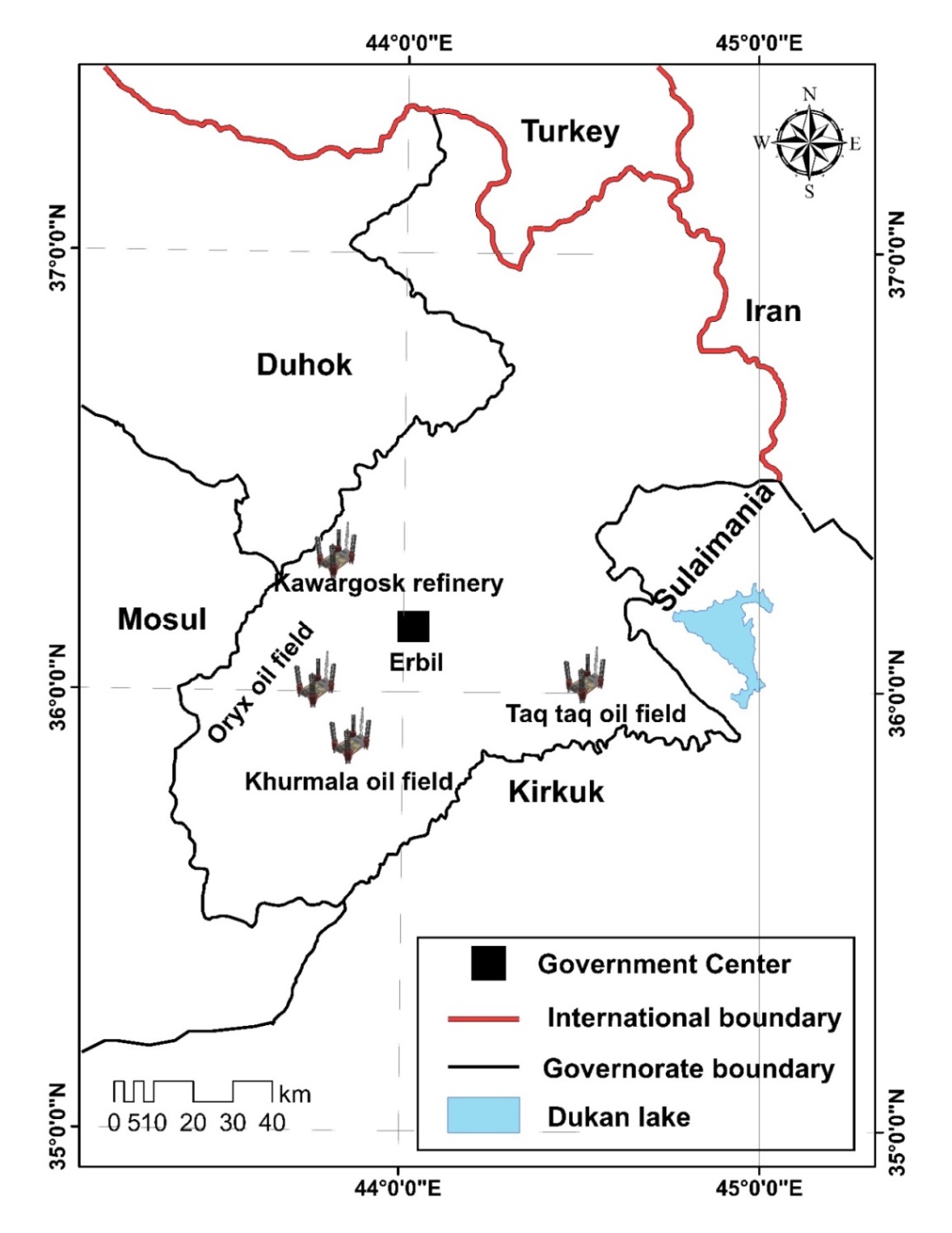Effect of heavy metals on kidney function among petroleum industry workers in the Kurdistan region
DOI:
https://doi.org/10.21271/ZJPAS.35.4.22Keywords:
Environment, Pollution, Heavy metals, petrochemicals, Kidney function.Abstract
Heavy metals have severely polluted the environment. The kidney is usually the first organ to be impacted by heavy metal exposure due to its potential to accumulate and detoxify metal ions. Some heavy metals and kidney function of oil field employees in Kurdistan Region of Iraq were studied in this research. This study was based on primary data collected throughout recent five years. Forty adult males who participated in this region were divided into two main groups; the former consisted of twenty individuals who had been exposed to Occupational Chemicals for more than five years in the oilfield area, and the other included twenty individuals who had not been exposed and used as a control group. Cobas C311 instrument was used as a biochemical analyzer to investigate some biochemical parameters in the serum level, and inductively coupled plasma was performed to estimate some heavy metals in whole blood. The results show a highly significant difference in some heavy metals such as (Silver (Ag), Iron (Fe), Cadmium (Cd), Manganese (Mn) and Vanadium (V)) which increased in the exposed group compared to the group that served as a control. However, there was no statistically significant difference in the levels of the other heavy metals (Mercury (Hg), Lead (Pb), and Zinc (Zn)) between the two groups described. Furthermore, the level of kidney function parameters, including creatinine and blood urea, was revealed non-significantly higher than in the exposed group compared to the control group, except for uric acid, which significantly rose.
References
ABDEL AZIZ, I. I. & AL AGHA, S. Z. 2006. Hematological and Biochemical Studies for Gasoline Toxicity Among Gasoline Workers In Gaza Strip. Al-Aqsa University Journal (Natural Sciences Series), 10, 41-58.
ABOU-ELWAFA, H. S., ALBADRY, A. A., EL-GILANY, A.-H. & BAZEED, F. B. 2015. Some biochemical and hematological parameters among petrol station attendants: a comparative study. BioMed research international, 2015.
AL-RUDAINY, L. A. 2010. Blood lead level among fuel station workers. Oman Medical Journal, 25, 208.
AMJADIAN, K., SACCHI, E. & RASTEGARI MEHR, M. 2016. Heavy metals (HMs) and polycyclic aromatic hydrocarbons (PAHs) in soils of different land uses in Erbil metropolis, Kurdistan Region, Iraq. Environmental monitoring and assessment, 188, 1-16.
ANTO, R., DESHMUKH, S., SANYAL, S. & BHUI, U. K. 2020. Nanoparticles as flow improver of petroleum crudes: study on temperature-dependent steady-state and dynamic rheological behavior of crude oils. Fuel, 275, 117873.
FARKHONDEH, T., NASERI, K., ESFORM, A., ARAMJOO, H. & NAGHIZADEH, A. 2021. Drinking water heavy metal toxicity and chronic kidney diseases: a systematic review. Reviews on Environmental Health, 36, 359-366.
FERRARO, P. M., COSTANZI, S., NATICCHIA, A., STURNIOLO, A. & GAMBARO, G. 2010. Low level exposure to cadmium increases the risk of chronic kidney disease: analysis of the NHANES 1999-2006. BMC public health, 10, 1-8.
FISHER, R. M. & GUPTA, V. 2021. Heavy metals. StatPearls [Internet]. StatPearls Publishing.
HUMUDAT, Y. R. & AL-NASERI, S. K. 2020. Heavy metals in dialysis fluid and blood samples from hemodialysis patients in dialysis centers in baghdad, iraq. Journal of Health and Pollution, 10.
JALILI, C., KAZEMI, M., CHENG, H., MOHAMMADI, H., BABAEI, A., TAHERI, E. & MORADI, S. 2021. Associations between exposure to heavy metals and the risk of chronic kidney disease: a systematic review and meta-analysis. Critical Reviews in Toxicology, 51, 165-182.
JUNG, W., KIM, Y., LIHM, H. & KANG, J. 2019. Associations between blood lead, cadmium, and mercury levels with hyperuricemia in the Korean general population: A retrospective analysis of population‐based nationally representative data. International Journal of Rheumatic Diseases, 22, 1435-1444.
KAN, X., DONG, Y., FENG, L., ZHOU, M. & HOU, H. 2021. Contamination and health risk assessment of heavy metals in China’s lead–zinc mine tailings: A meta–analysis. Chemosphere, 267, 128909.
KHAN, A. A., SULTAN, R., ZAMANI, G. Y. & RAHMAN, S. 2013. Biochemical and hematological analysis after exposure to hazardous materials during shoe making. Journal of Biology and Life Science, 4, 116-138.
LENTINI, P., ZANOLI, L., GRANATA, A., SIGNORELLI, S. S., CASTELLINO, P. & DELL'AQUILA, R. 2017. Kidney and heavy metals-The role of environmental exposure. Molecular medicine reports, 15, 3413-3419.
NEGI, R., PANDE, D., KARKI, K., KUMAR, A., KHANNA, R. S. & KHANNA, H. D. 2012. Trace elements and antioxidant enzymes associated with oxidative stress in the pre-eclamptic/eclamptic mothers during fetal circulation. Clinical nutrition, 31, 946-950.
NWADIBE, E. C., ANIEBONAM, E. E. & JUDE, O. U. 2020. Effect of crude oil pollution on soil and aquatic bacteria and fungi. J. Exp. Biol. Agric. Sci, 8, 176-184.
SABATH, E. & ROBLES-OSORIO, M. L. 2012. Renal health and the environment: heavy metal nephrotoxicity. Nefrología (English Edition), 32, 279-286.
SABOLIĆ, I. 2006. Common mechanisms in nephropathy induced by toxic metals. Nephron Physiology, 104, p107-p114.
SALL, M. L., DIAW, A. K. D., GNINGUE-SALL, D., EFREMOVA AARON, S. & AARON, J.-J. 2020. Toxic heavy metals: impact on the environment and human health, and treatment with conducting organic polymers, a review. Environmental Science and Pollution Research, 27, 29927-29942.
SATHYAMOORTHY, K., SIVARUBAN, T. & BARATHY, S. 2016. Assessment of heavy metal pollution and contaminants in the cattle meat. Journal of Industrial Pollution Control, 32, 350-355.
SOJINU, S. O. & EJEROMEDOGHENE, O. 2019. Environmental challenges associated with processing of heavy crude oils. Processing of Heavy Crude Oils, 241.
TAYRAB, E., ABDELRAHMAN, N. & TIRBA, A. K. 2014. Blood lead level among fuel station workers at Khartoum city. American Journal of Research Communication, 2, 74-82.
YUAN, T.-H., JHUANG, M.-J., YEH, Y.-P., CHEN, Y.-H., LU, S. & CHAN, C.-C. 2021. Relationship between renal function and metal exposure of residents living near the No. 6 Naphtha Cracking Complex: A cross-sectional study. Journal of the Formosan Medical Association, 120, 1845-1854.

Downloads
Published
How to Cite
Issue
Section
License
Copyright (c) 2023 Hussein S. Husseiny

This work is licensed under a Creative Commons Attribution 4.0 International License.













